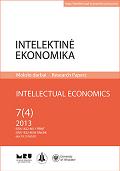
Complementary Strategies: Why we use our hands when we think
Complementary Strategies: Why we use our hands when we think
Keywords: complementary strategy; memory; attention; perception; cognition
More...
Keywords: complementary strategy; memory; attention; perception; cognition
More...




Keywords: Actor-Network Theory; centers of calculation; ethnography of inscription; science and technology studies; visual studies
More...

Keywords: affective entertainmentl; autopoiesis; embodiment; enactivism; living; mind; sense making
Evan Thompson’s paper has four parts. First, he says more about what he means when he asks, “what is living?” Second, he presents his way of answering this question, which is that living is sense-making in precarious conditions. Third, he responds to Welton’s considerations about what he calls the “affective entrainment” of the living being by the environment. Finally, he addresses Protevi’s remarks about panpsychism.
More...


Keywords: trust; business relationship; trust levels and forms; reasons for trust formation; trust criteria
In recent years, the aspect of trust in the context of inter-organizational relationship has deserved an increased attention from foreign scientists. The importance of investigation has been shown by a growing number of publications on the role of trust in international relations. The interest in this field of study, on the one hand, was determined by the changes in the business environment. The abundance of information, the appearance of network organizations, dynamics of environment conditions and the need for innovations lead the companies to a greater or smaller trust in business partners. Another reason lies in the positive effect of trust for successful interorganizational relationship. The trust in an organization also means trust in its people working in this organization. It affects the fact that the assesment of trust in business partners can be related to the highlighting of the aspects of psychology as well as behavior of the individuals. On the other hand, this evaluation may be related to the identification of the trust evaluation criteria (both in the level of individuals and organizations) and determination of the reasons of trust formation.
More...
Keywords: biomass production; land use; panel data; agriculture and energy markets
Through the use of the econometric technique of panel data, this work mainly investigates the relationships between agricultural and energy prices and the land use for triticale, which is nowadays seen as one of the most important biomass crops. This is done with the aim of assessing the land use implications potentially associated to the existence of policies implementing forms of incentive for renewable energy production. The analysis is developed while considering 22 selected OECD countries observed over a period of 17 years, between 1995 and 2011. The analysis results suggest that the estimated functional shape of the land use for triticale mainly depends upon variations in the yield, producer and electricity prices. The policy implications, which might be derived from these findings, highlight how farmers would not be willing to substantially increase the area devoted to triticale unless the adoption of some forms of economic incentives to enhance bio-energy production is taken into consideration.
More...
Keywords: bank policy; satisfaction; commercial banks; small and medium-sized enterprises (SME); regression analysis
Satisfaction with the policy of commercial banks concerning SMEs is one of the most important factors affecting the success of commercial banking activities. This paper analyses the scientific approaches to importance of SME satisfaction with the commercial banks. The analysis of scientific publications revealed that one of the most important factors affecting the satisfaction of small and medium-sized enterprises with banks is the policy concerning SMEs. Comparisons of the results of two studies, analysing satisfaction of small and medium-sized enterprises with the policy of commercial banks concerning SMEs, are presented in this article. One study was conducted in Canada in 2002, another one – in Lithuania in 2011. These studies identified and investigated the factors influencing satisfaction of small and medium-sized enterprises with the policy of commercial banks concerning SMEs, i.e., granting of loans corresponding business needs, offering appropriate financial services to business, creating favourable loan conditions, flexible response to changing business needs, business support by a bank during successful company activities period, business support by a bank in the critical moments of company activities, making timely financing decisions. It was found that all relationships between the factors and the satisfaction with the policy of commercial bank are linear and the correlation coefficients are quite high, indicating that the relationship between the factors is strong enough. However, these studies did not reveal statistical significance of the elements and their possible impact on the satisfaction with commercial banks policy. The current study includes all previously investigated factors and was conducted using the questionnaire method. The respondents were employees of Lithuanian small and medium-sized companies. Statistical analysis shows that only granting of loans corresponding business needs, offering appropriate financial services to business, creating favourable loan conditions, flexible response to changing business needs are statistically significant elements for satisfaction of small and medium-sized enterprises with the policy of commercial banks concerning SMEs. In addition, it was found that there is no multi-colinearity, there are no outliers among investigated factors. The regression equation of satisfaction of small and medium- sized enterprises with the policy of commercial banks concerning SMEs indicating the weight of each statistically significant factor to the overall satisfaction with the commercial bank policy was created. In other words, the equation shows how satisfaction with the policy of commercial bank varies changing one of the most important factors and helps predicting changes in satisfaction.
More...
Keywords: economic crisis; flexibility of labour market; unemployment rate
The Czech economy has been hit by the economic recession in recent years. Relatively strong economic growth and then economic downturn also had a significant impact on the labour market. The development of the unemployment rates – total, for women and men, however, showed significant differences between regions and districts of the Czech Republic. The article examines whether the differences in the unemployment rates in the regions and districts of the Czech Republic deepened or not during the economic crisis. The widening gap between regions can be a sign of decreasing flexibility of the Czech labour market. The article first briefly describes the recent economic development of the Czech economy. The end of the article is devoted to the comparison of the unemployment rate in the Czech Republic with other Member States of the European Union.
More...
Keywords: regulation; innovation; Economic Conventions (EC); agro-food chain; trust
Innovation is one of the key strategies proposed in the literature and economic policies as a crucial driver of the agro-food sector. Innovation, especially in the agricultural sector, is not manifested only as an adoption of new technologies, but also requires a balance between new practices, techniques and alternative ways to organize and manage markets, labour, land tenure and distribution of benefits. In this context, the Economic Conventions (EC) have found fertile ground for coordination in the agro-food sector. Starting from a recent work by Malafaia et al. (2010) on the EC and the mechanisms of coordination, the paper analyzes the Integrated Projects of Food Chain (IPFs) approved by the Apulia region. The data collection was carried out through interviews and meetings with various actors in the supply chain and via Territory Listening Plane analysis, in order to identify the types of formalized or non formalized coordination, practiced by the agents. Further challenges are the definition and the identification of the forms of coordination set up by agents of the supply chains of IPFs via the implementation of the economic/computer/management model, which leads to the development of new business processes and to the validation of a prototype model of knowledge transfer and check-ups. In the end of the paper, conclusions are drawn.
More...
Keywords: economic migration; international migration; unemployment; earnings
International migration has increased severely in the last decade in Europe, particularly between Lithuania and Spain. This research addressed trends of earnings and unemployment and their impact on both emigration and immigration in Spain and Lithuania, relying on the data coming from the period of 2000 till 2012. An empirical analysis of both countries using data from Eurostat and national statistics departments has shown evidence that emigration and immigration were continually growing, showing, however, different behavior in terms of imbalances on earnings and unemployment. Thus, in Spain, the main factor that affects emigration is unemployment, and earnings significantly affect immigration. In turn, the results for Lithuania have shown that the main factor that affects emigration is the level of earnings, and unemployment significantly affects immigration.
More...
Keywords: cluster analysis; unemployment; labor market; economic crisis
The aim of this paper is using cluster analysis to show changes in the clusters composition of 27 EU countries during the current economic crisis. The authors use the characteristics of labor market as an input into cluster analysis. The situation on the labor market is one of the most discussed sections of countries’ economies. The authors discuss the impact of the current economic crisis on the structure of labor market and the composition of the group of countries before (2008) and during (2012) the crisis. The authors use the method of cluster analysis to generate the group of countries. They have chosen the following indicators of labor market: unemployment of different year old groups, unemployment of gender groups and the rate of participation of these groups.
More...
SCIENTIFIC LIFE: 70 years of the Department of Common Economic Theory at the University of Economics - Varna
More...The transitional period is always connected to redistribution processes and change in the financial wealth of the economic agents. The examination of the redistribution of wealth and its dynamics is important related to the possibilities for a more complete study and rationalization of the changes that occurred in the economy. In this connection the dynamics of financial wealth of the institutional sectors in Bulgaria for the period 1990 – 2005 is assessed and analyzed. The main net creditors and debtors to the economy are differentiated and their behavior before and after the change of the monetary regime is examined. Econometric simulations are made on the main factors that determine the shift in the sector financial wealth. In the progress of the expose grounded is the hypothesis (which to a great extent is confirmed by the empirical results) for a functional relation between the dynamics of redistribution and the change of the monetary regime.
More...